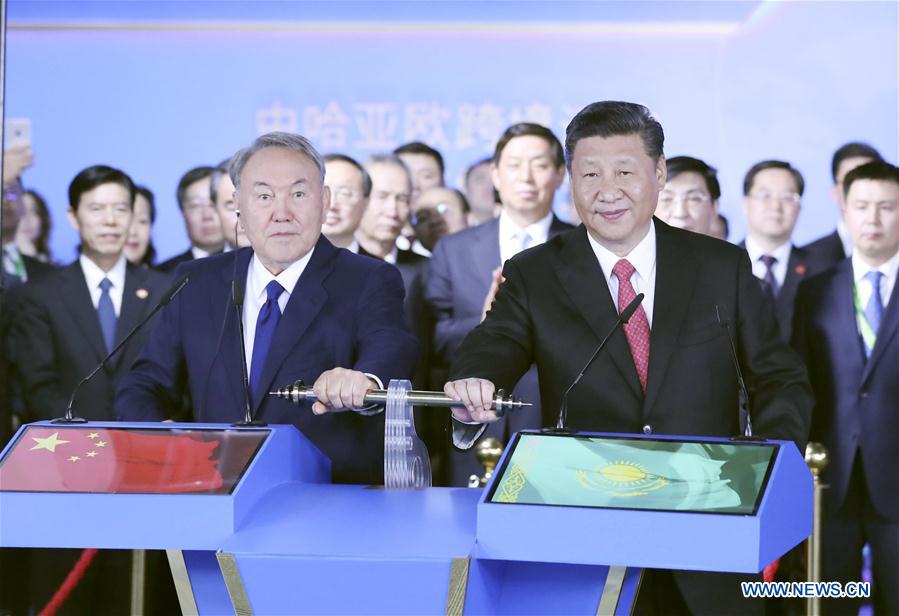
Chinese President Xi Jinping (R front) and his Kazakh counterpart Nursultan Nazarbayev (L front) inspect via videolink two key hubs of the cross-border transportation at the Chinese national pavilion of the Expo 2017 in Astana, Kazakhstan, June 8, 2017. Xi, accompanied by Nazarbayev, on Thursday visited the Chinese national pavilion of the Expo 2017 in Astana, and urged bilateral efforts to facilitate the China-Kazakhstan cross-border transportation. (Xinhua/Ding Lin)
ASTANA, June 8 (Xinhua) -- Chinese President Xi Jinping on Thursday visited the Chinese national pavilion of the Expo 2017 in Astana, and urged bilateral efforts to facilitate the China-Kazakhstan cross-border transportation.
Accompanied by his Kazakh counterpart Nursultan Nazarbayev, Xi toured different sections of the pavilion. The two heads of state also experienced simulated driving in a high-speed rail.
The Chinese pavilion, under the theme of "future energy, green silk road," was the first to start construction and the first one put into test operations. Covering around 1,000 square meters, it aims to share China's experience in such areas as traditional energy upgrading, new energy, environmental protection and sustainable development.
The two presidents later inspected via videolink the logistic center in China's eastern city of Lianyungang and a dry port in Horgos, a city of China's Xinjiang Uygur Autonomous Region bordering Kazakhstan.
Both cities are key hubs of the Europe-bound China Railway Express and the New Eurasian Land Bridge. In 2016, more than 1,200 trains transited through Kazakhstan, with rail freight handled by the two countries' railways reaching 8.2 million tons and the number of freight containers rising by more than two-fold.
In a statement, Xi said that China Railway Express trains transited through the Central Asian country have benefited not only the two nations, but also countries along the Belt and Road routes.
Facilitating the transportation and creating more opportunities for cooperation, these trains have exemplified the fruits of the Silk Road Economic Belt and the 21st Century Maritime Silk Road, both components of the China-proposed Belt and Road Initiative, said Xi.
He noted that as Kazakhstan is committed to aligning its economic plan of "Nurly Zhol," or "Bright Path" in the Kazakh language, with the Belt and Road Initiative, it has turned from a landlocked nation into a key hub for transportation in the Eurasia continent, and enhanced its role in the East-West trade link.
The Chinese leader urged concerted efforts of both countries to make the new Eurasia land and maritime routes linked by Lianyungang and Horgos pilot projects of the Belt and Road Initiative, so as to promote peace, prosperity, openness, innovation and exchanges of civilizations along these paths.
For his part, Nazarbayev thanked Xi for coming to attend the Astana Expo, and for the Chinese support of this event.
The Kazakh-Chinese cooperation on cross-border transportation, a successful case of linking the two countries' development strategies, will bring economic prosperity and social well-being to those countries along the Belt and Road, said Nazarbayev.




